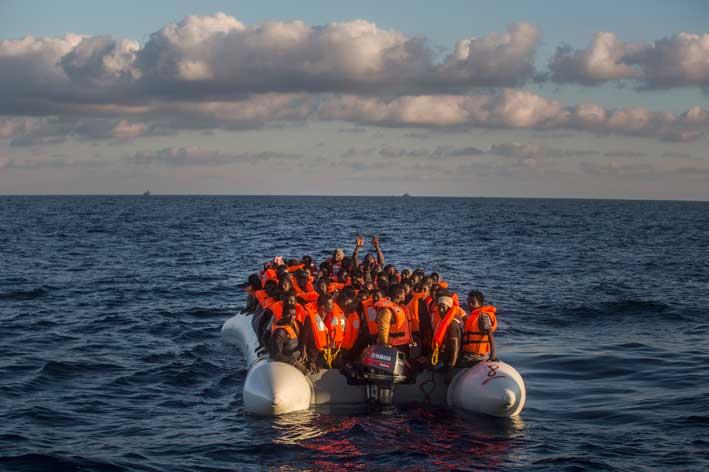Armed groups in Libya are involved in trafficking of persons and the smuggling of migrants for substantial financial benefits, and with seemingly complete impunity, a recently published UN report has explained.
These activities fuel instability, and the Panel expresses concern about the impunity of those ‘systematically violating the human rights of migrants, notably due to weak law enforcement and large security vacuums’.
‘Criminal networks organize convoys of migrants and use sexual exploitation to generate significant revenues.’
690,351 migrants are currently in Libya according to a report published by the International Organization for Migrants (IOM) in April 2018, not to mention that in October 2017, the Office of the United Nations High Commissioner for Refugees announced that ‘about 20,500 migrants and refugees were held captive by smugglers in various locations’.

Trafficking in persons
These networks do their utmost to generate profits along the entire migrant smuggling chain, all the way from sub-Saharan traffickers, to Libyan actors who manage premises for the sequestration and extortion of migrants. Along the way, the aforementioned armed groups occasionally charge ‘taxes’ and provide protection services to the smugglers’ convoys against payment.
Smuggles are also known to arm themselves with the networking capabilities of social media, developing practices where they promote migration to Europe – a practice the report calls ‘a robust financial capacity and the coercion of vulnerable migrants through fear and maltreatment’.
The report gives accounts from Nigerian women who were interviewed to aid investigations into networks for trafficking in persons spreading from Nigeria through Libya to Italy, specialized in sexual exploitation. The women are woo-ed with promises of job opportunities in beauty salons or tailor shops in Italy, usually by a relative or a close friend.
The individuals who operate the brothers, situated in Libya and Italy for this particular investigation, are often referred to as ‘mamas’ or ‘madams’ and are the key actors in this network. They act as ‘sponsors’ who use the monetary debt as leverage to threaten the girls and their families. They travel across Nigeria, the Niger – all the way to Libya by bus, frequently paying ‘protection tax’ to local armed groups operating in the surrounding areas.

The women are sexually exploited while being detained in ‘connection houses’ spread across various cities in Libya, some of them holding up to 150 girls against their will. The houses would be owned by Libyans, managed by Nigerian couples, and Nigerian traffickers would pay the rent for the houses and share up to 50% of the benefits with the aforementioned Libyan landlords.
Whilst in these establishments, the women reported that they were subjected to ‘collective sexual abuse during so-called ‘night parties’’. Common punishments for refusing to work included physical abuse, sequestrations and starting, not to mention that forced abortions are performed by administering home-made medications composed of ‘mixed herbs’.
Libyan criminal groups armed with knives and firearms sometimes attached the ‘connection houses’ at night, sexually abused the women and extorted protection money.
Mistreatment during attempts to cross the Mediterranean were not unheard of either, as armed guards routinely fired into the air, ‘forcing the migrants to carry rubber boats from the beach to the sea’. These boats were ‘obviously unseaworthy’, and are reported to have begun to sink within the first few hours.

Smuggling of Migrants
‘In July 2017, the director of the Kufrah detention center reported to the Ministry of the Interior the existence of seven migration routed from Chad and the Sudan to Europe through Libya and Egypt. He estimated that 800 to 1,000 migrants, paying $5,000 each, entered Libya daily.’
These irregular migrations are seen as a source of chaos by local authorities in Libya as the armed groups compete over the income revenue generated through the protection of smugglers’ convoys.
The Libyan National Army (LNA) is said to be not only be complicit in the trafficking at the border, but directly involved by means of ‘providing escorts to convoys from the border with the Sudan to Kufrah at a rate of 10,000 dinars per pickup’ – Kufrah being the location of a camp where extortion and forced labor have been reported.
Eritrean girls described how they were offered a ‘travel package to Europe’ for $7,000 before being held at warehouses in Bani Walid. These warehouses help up to 1,200 people, including men, women and children from Eritrea and Somalia, all guarded with an estimated seventy-armed men. They were then ordered to contact their families for an additional $2,000 to cover the final leg of the trip – tortured and starved whilst they waited, and shot by the smugglers when attempting to escape.
The final leg of travel led to more suffering, as migrants were reported to have been ‘crammed onto trucks’, some of them dying from suffocation, while others fell out of the speeding trucks.
Recommendations
In its recommendations to Member States and to those ‘contributing to the evacuation of migrants from Libyan detention centers, and international and regional organizations, the Panel encourages the sharing of information on the ‘migrants’ conditions of detention and on the individuals or entities involved in trafficking in persons, money laundering, extortion, sexual abuse and exploitation’.
They also encourage the Government of National Accord, which is an interim government for Libya that was formed through the United Nations, to implement the United Nations Convention against Transnational Organized Crime, the Protocol to Prevent, Suppress and Punish Trafficking in Persons, Especially Women and Children, and the Protocol against the Smuggling of Migrants by Land, Sea and Air.